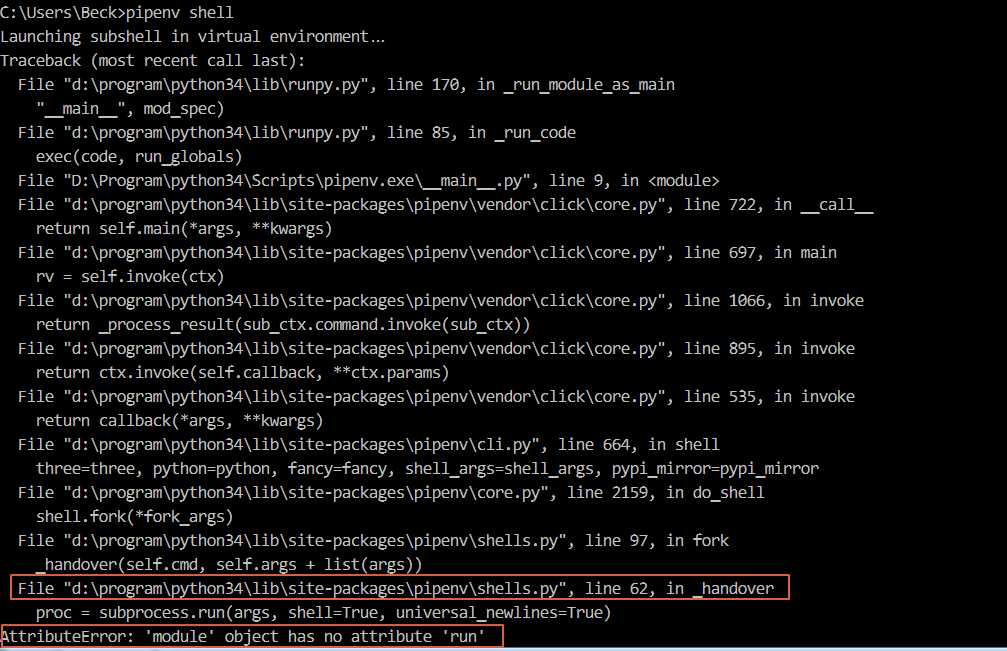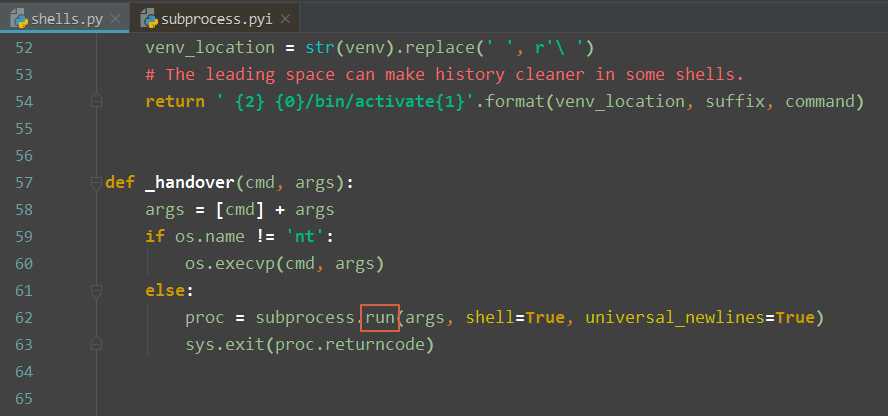标签:ted 没有 let 用法 lse session style 虚拟环境 targe
利用pipenv shell切换到虚拟环境时,显示报错:AttributeError: ‘module‘ object has no attribute ‘run‘

可以看到是d:\program\python34\lib\site-packages\pipenv\shells.py文件的第62行报错了,提示模块没有run的属性,于是就跑到该文件的第62行去看

选中run,CTRL+B发现能看到源码,源码如下:
if sys.version_info >= (3, 6):
# Nearly same args as Popen.__init__ except for timeout, input, and check
def run(args: _CMD,
timeout: Optional[float] = ...,
input: Optional[_TXT] = ...,
check: bool = ...,
bufsize: int = ...,
executable: _PATH = ...,
stdin: _FILE = ...,
stdout: _FILE = ...,
stderr: _FILE = ...,
preexec_fn: Callable[[], Any] = ...,
close_fds: bool = ...,
shell: bool = ...,
cwd: Optional[_PATH] = ...,
env: Optional[_ENV] = ...,
universal_newlines: bool = ...,
startupinfo: Any = ...,
creationflags: int = ...,
restore_signals: bool = ...,
start_new_session: bool = ...,
pass_fds: Any = ...,
*,
encoding: Optional[str] = ...,
errors: Optional[str] = ...) -> CompletedProcess: ...
else:
# Nearly same args as Popen.__init__ except for timeout, input, and check
def run(args: _CMD,
timeout: Optional[float] = ...,
input: Optional[_TXT] = ...,
check: bool = ...,
bufsize: int = ...,
executable: _PATH = ...,
stdin: _FILE = ...,
stdout: _FILE = ...,
stderr: _FILE = ...,
preexec_fn: Callable[[], Any] = ...,
close_fds: bool = ...,
shell: bool = ...,
cwd: Optional[_PATH] = ...,
env: Optional[_ENV] = ...,
universal_newlines: bool = ...,
startupinfo: Any = ...,
creationflags: int = ...,
restore_signals: bool = ...,
start_new_session: bool = ...,
pass_fds: Any = ...) -> CompletedProcess: ...
但是请看第一行 if sys.version_info >= (3, 6): ,我们姑且猜测一下,这个3.6就是python的版本号,如果版本大于3.6,就用第一个run函数,否则就用第二个run函数,这两个函数有什么不同——第一个run函数多了下面两行
encoding: Optional[str] = ...,
errors: Optional[str] = ...)
可是,既然版本大于3.6和小于3.6都会调用已存在的run函数,那为什么会报错?我们来看一下比较完整的代码
不知道有没有留意到当版本大于3.5时,才会去第二个if里判断是否大于3.6,而我当前的版本是3.4.4,因此不满足大于3.5的if判断,而满足大于3.3的if判断,此时下面的方法都是call了(事实上,只要满足版本<3.5,都应该调用的是call方法)
if sys.version_info >= (3, 5): class CompletedProcess: # morally: _CMD args = ... # type: Any returncode = ... # type: int # morally: Optional[_TXT] stdout = ... # type: Any stderr = ... # type: Any def __init__(self, args: _CMD, returncode: int, stdout: Optional[_TXT] = ..., stderr: Optional[_TXT] = ...) -> None: ... def check_returncode(self) -> None: ... if sys.version_info >= (3, 6): # Nearly same args as Popen.__init__ except for timeout, input, and check def run(args: _CMD, timeout: Optional[float] = ..., input: Optional[_TXT] = ..., check: bool = ..., bufsize: int = ..., executable: _PATH = ..., stdin: _FILE = ..., stdout: _FILE = ..., stderr: _FILE = ..., preexec_fn: Callable[[], Any] = ..., close_fds: bool = ..., shell: bool = ..., cwd: Optional[_PATH] = ..., env: Optional[_ENV] = ..., universal_newlines: bool = ..., startupinfo: Any = ..., creationflags: int = ..., restore_signals: bool = ..., start_new_session: bool = ..., pass_fds: Any = ..., *, encoding: Optional[str] = ..., errors: Optional[str] = ...) -> CompletedProcess: ... else: # Nearly same args as Popen.__init__ except for timeout, input, and check def run(args: _CMD, timeout: Optional[float] = ..., input: Optional[_TXT] = ..., check: bool = ..., bufsize: int = ..., executable: _PATH = ..., stdin: _FILE = ..., stdout: _FILE = ..., stderr: _FILE = ..., preexec_fn: Callable[[], Any] = ..., close_fds: bool = ..., shell: bool = ..., cwd: Optional[_PATH] = ..., env: Optional[_ENV] = ..., universal_newlines: bool = ..., startupinfo: Any = ..., creationflags: int = ..., restore_signals: bool = ..., start_new_session: bool = ..., pass_fds: Any = ...) -> CompletedProcess: ... # Same args as Popen.__init__ if sys.version_info >= (3, 3): # 3.3 added timeout def call(args: _CMD, bufsize: int = ..., executable: _PATH = ..., stdin: _FILE = ..., stdout: _FILE = ..., stderr: _FILE = ..., preexec_fn: Callable[[], Any] = ..., close_fds: bool = ..., shell: bool = ..., cwd: Optional[_PATH] = ..., env: Optional[_ENV] = ..., universal_newlines: bool = ..., startupinfo: Any = ..., creationflags: int = ..., restore_signals: bool = ..., start_new_session: bool = ..., pass_fds: Any = ..., timeout: float = ...) -> int: ... else: def call(args: _CMD, bufsize: int = ..., executable: _PATH = ..., stdin: _FILE = ..., stdout: _FILE = ..., stderr: _FILE = ..., preexec_fn: Callable[[], Any] = ..., close_fds: bool = ..., shell: bool = ..., cwd: Optional[_PATH] = ..., env: Optional[_ENV] = ..., universal_newlines: bool = ..., startupinfo: Any = ..., creationflags: int = ..., restore_signals: bool = ..., start_new_session: bool = ..., pass_fds: Any = ...) -> int: ...
了解这个,就知道如何解决了,只要修改源码把run换成call即可(如果要使用3.5及以上的版本,建议把call再换回run)

再次使用pipenv shell,发现可以切换到虚拟环境了

https://cuiqingcai.com/5846.html
解决:pipenv shell报错:AttributeError: 'module' object has no attribute 'run'
标签:ted 没有 let 用法 lse session style 虚拟环境 targe
原文地址:https://www.cnblogs.com/cnhkzyy/p/9589200.html